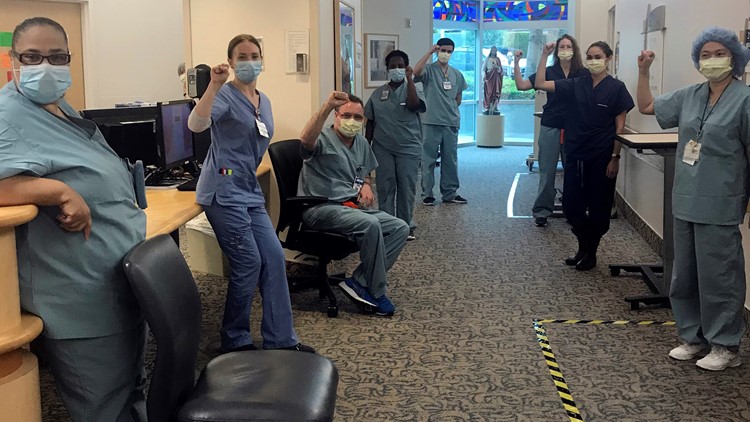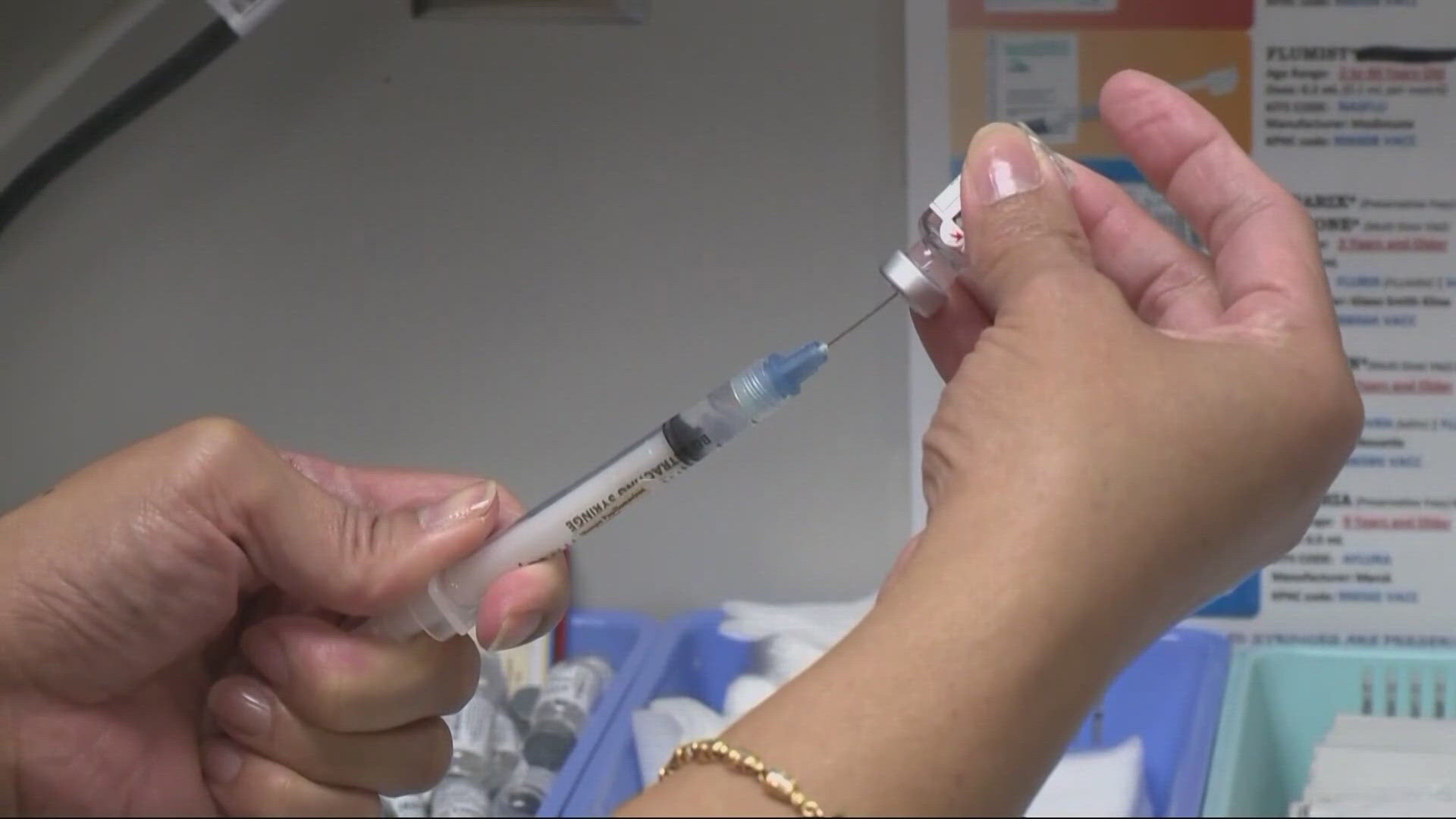Nurse Mike Gulick was meticulous about not bringing the coronavirus home to his wife and their 2-year-old daughter. He’d stop at a hotel after work just to take a shower. He’d wash his clothes in Lysol disinfectant. They did a tremendous amount of hand-washing.
But at Providence Saint John’s Health Center in Santa Monica, California, Gulick and his colleagues worried that caring for infected patients without first being able to don an N95 respirator mask was risky. The N95 mask filters out 95% of all airborne particles, including ones too tiny to be blocked by regular masks. But hospital administrators said they weren’t necessary and didn’t provide them, he said.
Then, last week, a nurse on Gulick’s ward tested positive for the coronavirus, which causes COVID-19. The next day, doctors doing rounds on their ward asked the nurses why they weren’t wearing N95 masks, Gulick said, and told them they should have better protection.
For Gulick, that was it. He and a handful of nurses told their managers they wouldn’t enter COVID-19 patient rooms without N95 masks.
“I went into nursing with a passion for helping those who are most vulnerable and being an advocate for those who couldn’t have a voice for themselves, but not under the conditions we’re currently under,” Gulick said.
The hospital suspended him and nine colleagues, according to the National Nurses United, which represents them. Ten nurses are now being paid but are not allowed to return to work pending an investigation from human resources, the union said.
They are among hundreds of doctors, nurses and other health care workers across the country who say they’ve been asked to work without adequate protection. Some have taken part in protests or lodged formal complaints. Others are buying or even making their own supplies.
One nurse was fired after refusing to remove her own N95 mask and sterile gloves and instead wear a “tissue-paper thin” surgical mask while on duty except for when caring for a known COVID-19 patient.
Dawn Kulach was fired on April 10 by Virtua Health's hospital in Voorhees, New Jersey, shortly after she recovered from pneumonia caused by the virus and returned to work. Kulach said in an interview that it was unsafe to work without the N95 mask because the virus is circulating in hospital air ducts and there's no way to know which patients have the virus. She also insisted on wearing sterile gloves to use a computer and other shared items at the nursing station.
Virtua's chief clinical officer, Dr. Reginald Blaber, said in a statement that the hospital now provides N95 masks to staff caring for patients with the virus or awaiting test results, and to staff in high-risk areas like the ICU and ER. Staff in other areas are issued one surgical mask daily.
Guidelines from the Centers for Disease Control and Prevention don’t require N95 masks for COVID-19 caregivers, but many hospitals are opting for the added protection because the infection is extremely contagious. The CDC said Wednesday at least 9,200 health care workers have been infected.
For most people, the coronavirus causes mild or moderate symptoms, such as fever and cough, that clear up in two to three weeks. For some, especially older adults and people with existing health problems, it can cause more severe illness, including pneumonia, and death.
Saint John’s said that, as of Tuesday, it was providing N95 masks to all nurses caring for COVID-19 patients and those awaiting test results. Its statement said the hospital had increased its supply and was disinfecting masks daily.
“It’s no secret there is a national shortage,” said the statement. The hospital would not comment on the suspended nurses.
Angela Gatdula, a Saint John's nurse who fell ill with COVID-19, said she asked hospital managers why doctors were wearing N95s but nurses weren’t. She says they told her the CDC said surgical masks were enough to keep her safe.
Then she was hit with a dry cough, severe body aches and joint pain.
“When I got the phone call that I was positive, I got really scared,” she said.
She’s recovering and plans to return to work next week.
“The next nurse that gets this might not be lucky. They might require hospitalization. They might die,” she said.
As COVID-19 cases soared in March, the U.S. was hit with a critical shortage of medical supplies including N95s, which are mostly made in China. In response, the CDC lowered its standard for health care workers’ protective gear, recommending they use bandannas if they run out of the masks.
Some exasperated health care workers have complained to the Occupational Safety and Health Administration.
“I ... fear retribution for being a whistleblower and plead to please keep me anonymous,” wrote a Tennessee medical worker, who complained staffers were not allowed to wear their own masks if they weren’t directly treating COVID-19 patients.
In Oregon, a March 26 complaint warned that masks were not being provided to nurses working with suspected COVID-19 patients. Another Oregon complaint alleged nurses “are told that wearing a mask will result in disciplinary action.”
Some are taking to the streets.
On Wednesday, nurse unions in New York, Massachusetts, Michigan, Illinois, California and Pennsylvania scheduled actions at their hospitals and posted on social media using the hashtag PPEoverProfit. PPE, or personal protective equipment, refers to items such as masks and gowns.
Nurses at Kaiser Permanente’s Fresno Medical Center in California demanded more protective supplies at a protest during their shift change Tuesday. The hospital, like many in the U.S., requires nurses to use one N95 mask per day, which has raised concerns about carrying the infection from patient to patient.
Ten nurses from the facility have tested positive, Kaiser said. Three have been admitted to the hospital, and one is in critical care, protest organizers said.
Wade Nogy, a Kaiser senior vice president, denied union claims that nurses have been unnecessarily exposed.
“Kaiser Permanente has years of experience managing highly infectious diseases, and we are safely treating patients who have been infected with this virus, while protecting other patients, members and employees,” Nogy said.
Amy Arlund, a critical care nurse at the facility, said that before the pandemic, following infection control protocols they’re currently using would have been grounds for disciplinary action.
“And now it’s like they’ve thrown all those standards out the window as if they never existed,” Arlund said. “It’s beyond me.”
___
AP Medical Writer Linda A. Johnson contributed to this report from Trenton, N.J.



